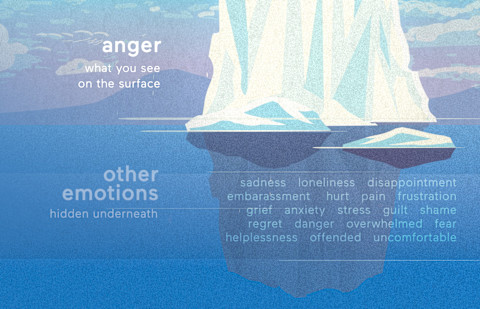How To Use The Anger Iceberg To Work Through Conflict & Emotions

We've all felt anger in our lives, perhaps some of us more than others. But what if anger is "just the tip of the iceberg"? That's the theory behind the Anger Iceberg, and understanding it can help with fostering emotional intelligence.
Anger gets a bad rep, but it can actually be a useful tool for understanding what's going on beneath the surface (or the tip of the iceberg), when we learn to dig deeper into where the anger is coming from. Recognizing when anger is rooted in sadness, shame, or a number of other different emotions can allow us to process those emotions and work through them in a healthy, productive way.
Where did the Anger Iceberg originate?
The Anger Iceberg was first coined by The Gottman Institute, a team of researchers spearheaded by psychologists John and Julie Gottman. Their mission is to help couples and families work through difficulties and cultivate stronger, more loving relationships. Their research led to an understanding of anger as often a mask or cover for deeper emotions. This can be any range or combination of emotions, including grief, jealousy, loneliness, fear, anxiety, exhaustion, pain, embarrassment—the list goes on.
The Institute notes that anger need not be suppressed, as it is a valid and necessary emotion for understanding what's going on inside of us. And further, that understanding anger empowers individuals to have constructive, healing conversations around their pain.
Of course, the emotion(s) causing someone's anger is not always clear, which is why it's just one part of the inner work necessary to make this tool useful.

How can the Anger Iceberg be used in situations of conflict?
Conflicts happen, and when they do, it's important for all parties to have a basic understanding of the Anger Iceberg and the fact that anger may not be the primary emotion at play. As holistic, clinical psychologist Nicole Lippman-Barlie, Ph.D., tells mindbodygreen, "It's helpful to use this kind of metaphor during situations of conflict as it reminds us to look beneath the surface of our immediate feelings and potential impulses of why we are feeling angry."
For example, perhaps you're dealing with the death of a loved one, and the grief, pain, or even guilt of that loss is bubbling up on the surface, leading you to lash out at friends and family. That anger is often protecting you from the deeper, more vulnerable emotions involved in loss that are more challenging to express.
"Like any other emotion, the feeling of anger is communicating something to us," Lippman-Barlie notes. "The iceberg makes us aware that we need to look further into why we are feeling angry and what other emotions have led to the anger we are currently experiencing."
And just as important as understanding your own anger is understanding anger that's directed toward you from another. When we can recognize another's anger as something deeper, like pain or shame, we can approach conflict more compassionately, without reacting defensively.
4 tips for making anger more productive.
We asked Lippman-Barlie for her tips on working through anger. Here's what she had to say:
Understand what triggered you.
Now that you know about the Anger Iceberg, you can ask yourself, where is this emotion coming from? To do this, Lippman-Barlie recommends paying attention to the things (thoughts, feelings, experiences) that led to your anger. This will also help you identify specific triggers in the future.
"Look at your anger as communication," she says. "What is it trying to tell you? After all, it's here for a reason."
Identify what's going on underneath the tip of the iceberg.
Once you've identified the trigger, you can get to the root of the deeper emotion and prioritize that over your anger. If it's shame, for example, you may have to look at past experiences or limiting beliefs you have about yourself. If it's jealousy, maybe you have to work through feelings of insecurity. But ultimately, it's about unpacking your anger to understand yourself with more clarity.
Help yourself feel calmer.
Within all of this work is a need to self-soothe and emotionally regulate. Of course, as mentioned, anger is valid—but we don't want it to become destructive. "Take a walk, focus on some deep breaths, and relax the tension you are experiencing in your body," Lippman-Barlie says. "Let time take its course. If you are still feeling like you need something more to do in order to work through your feelings in the moment, do something physical like gardening, or exercise by doing some jumping jacks."
Channel your energy.
When our emotions are overwhelming (and confusing) us, it can be difficult to focus on anything else. But understanding them will help you channel that energy into things you'd rather focus on, "whether that's making a societal impact and contributing to a cause, or changing something in your personal life that you are unhappy with," Lippman-Barlie adds in closing.
Anger is a natural and essential emotion that is bound to come up in one way or another. Don't run from it. When we can learn how to deal with our own anger, it benefits not only us but everyone in our lives, helping us maintain positive relationships that are conscious, open, and mindful.

